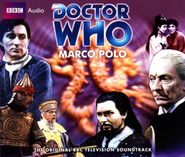
Aired 22 February – 4 April 1964
‘Marco Polo’ is the first of many serials to have gone missing from the BBC Archives over the years, a victim of a time when the BBC saw little future in television episodes and had no anticipation of the longevity and continued success of Doctor Who into the twenty-first century nor the advent of home video releases. Fortunately, audio recordings and telesnaps still exist for these missing episodes to give at lest a visage of what the complete package must have been like, but ‘Marco Polo’ is certainly a casualty of the purge given the extensive and lavish production values and set designs on display.
This is the first strict historical adventure for Doctor Who, and John Lucarotti’s tale is unafraid to delve into the era fully, gory deaths and even a suicide taking place throughout the expanded seven-episode running time. Historical tales don’t necessarily garner as much attention or adoration as the stories driven more by science fiction, but ‘Marco Polo’ sets the bar extremely high for future historicals going forward and gives each of the characters plenty of time to develop and flourish. Mark Eden is superb as the titular Polo, effortlessly playing off of the leads and presents himself as a cunning and intelligent being. Zienia Merton’s Ping Cho is also a fascinating character, in essence a mirror for Susan who is likewise experiencing the world for the first time. As a villain, Derren Nesbitt adds considerable depth to the warlord crafty Tegana, and his ultimate demise at his own hands is quite emotional. As Kublai Khan and proud mirror of the Doctor himself, Martin Miller is very enjoyable as well, offering a blend of dangerous power and seeming friendliness.
The regulars are, of course, very well served by the script as well. This is arguably the first serial that gives Carole Ann Ford truly meaningful work to do beyond just reacting, and she delivers wonderfully, portraying a more fearful and isolated version of Susan in a strange landscape where the Doctor is preoccupied with getting back his TARDIS. Of course, a somewhat more light-hearted side to the Doctor is shown as well, and his penchant for games makes its first appearance here. Ian, of course, is asked to shoulder more of the active load, but William Russell continues to excel as the more classically heroic companion, even if the notion of a schoolteacher overpowering a Mongol warrior is a bit far-fetched. At the same time, both Ian and Barbara continue to be the educated voices of reason for the characters on screen as well as for the viewers at home. This education aspect, teaching about condensation being this story’s prime example, had been handled somewhat clumsily in the first few episodes, but it flows quite fluidly and unobtrusivelyhere.
It’s a shame that a story that seems to hold up so well after all of this time has been lost, but the remaining audio and visual fragments tease at just how incredible this first historical must have been in its entirety. With its sprawling and varied environments, intriguing characters and ploys, and voiceovers and progress mapping that shows incredible foresight for a time before these devices became commonplace, ‘Marco Polo’ remains a great example of Doctor Who combining entertainment and education with a surprisingly big-budget feel, throwing in great character development for good measure.


Leave a Reply